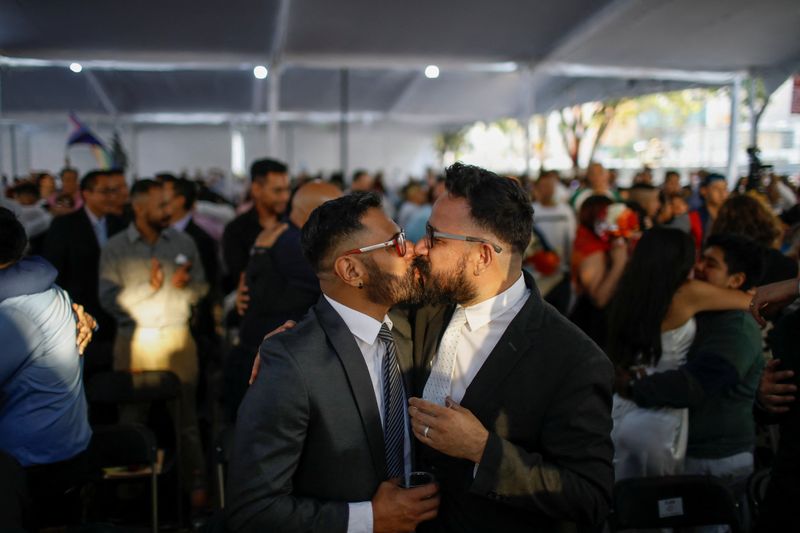Mexico City holds mass celebration for same-sex weddings, gender ID changes
2023.06.24 01:49
3/3

© Reuters. A couple kisses during a mass wedding as part of the LGBT+ pride month celebrations in Mexico City, Mexico June 23, 2023. REUTERS/Raquel Cunha
2/3
MEXICO CITY (Reuters) – Hundreds of same-sex couples and transgender people in Mexico City celebrated weddings and the completion of administrative processes to change their gender on Friday, in a mass ceremony a day before the city’s annual gay pride march.
Some 120 couples met the requirements to get married under the slogan “Hand in hand, we march with pride,” the city government said in a statement. Marriage helps to regularize a couple’s civil status and provides them with legal benefits.
Keila Espinoza, a 38-year-old who married her partner Vaneza Garcia, said it was very emotional to the step into marriage after having lived together: “I didn’t think it would happen like this. It’s very exciting.”
One groom, Edgar Mendoza, said he tied the knot after 10 years with his partner.
“This is a very important document, more than a piece of paper or a symbol of marriage. It is security that I can give to my family,” he said.
In 2009, Mexico City became the first jurisdiction in Latin America to legalize same-sex marriage. It took until last year, however, for the rest of the country to follow suit with Tamaulipas becoming the final state to do so in October.
Another 131 people in the capital are set to complete administrative gender-change processes, the city government said. Transgender people face many hurdles when they cannot update legal documents such as ID cards to reflect their gender identity.
The process, which is free in Mexico City, comes after legal reform in 2014 allowing adults to change their gender on birth certificates and electoral cards if they identify as a different gender from the one assigned at birth.
On Saturday, supporters of LGBTQ+ rights are set to march down one of Mexico City’s main avenues to the central square to raise awareness of violence and discrimination against the community and push for equality.
Last year’s march, the first after a two-year hiatus due to the coronavirus pandemic, drew hundreds of thousands of people, according to some estimates.








